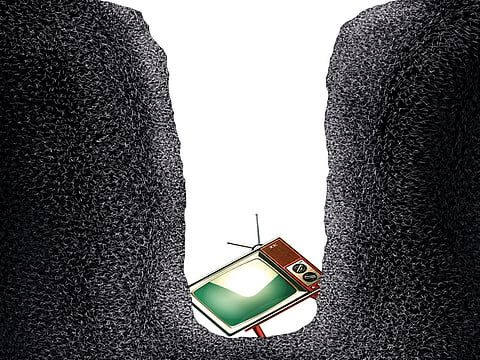Al Jazeera undermining Arab interests
With an agenda-driven coverage, the television channel managed to isolate Qatar in the Arab world

The focus of Arab media is national issues, and it addresses these issues in the best interest of Arab nations. In addition to its educational and awareness role, Arab media also offers its service to readers in Arab countries and the rest of the world, especially the capital cities that are known as home of the global news industry — such as London, Paris, Washington — which host some of the leading international news agencies. Media witnessed major changes, following the technological, telecommunication and transportation revolution that led to globalisation, beginning in the 1980s and opening the gateways for communication between far off countries and cultures.
In the era of globalisation, national boundaries and geographical distances have diminished while civilisations around the globe have opened up to one another in technological, cultural, scientific and economic terms. This has also led to the opening up of world markets. Globalisation is a transition from solid modernity, which refers to the concept of nation, state and society, to a fluid form of social life that has made everything accessible to everyone, anywhere and at any time — as defined by Polish sociologist and philosopher Zygmunt Bauman.
In the 1990s, the world witnessed the dawn of cross-border media, following the emergence of satellite channels, the internet and smartphones. With rapidly-developing information technology, media content has been transformed; it has become more effective and impressive than ever. This is simply because it contains massive amounts of information that are presented to the viewers in attractive ways to influence them so that it has a major impact on their principles and convictions. Media can make people change their beliefs and even replace them with a new set of views that enable them to see local and global issues in a different light.
In November 1996, the Al Jazeera satellite TV channel appeared in the Qatari capital of Doha, where it carved a niche not only in that country but also in the Gulf and Arab population in general. Later, Al Jazeera expanded its network across the world with its media arms in foreign languages in a number of world capitals, including Washington.
While it is easy to find out if a media machine has a powerful impact on its audience, it is difficult to decipher its motives and hidden messages that it seeks to convey.
Maybe, this is what happened to the people when Al Jazeera started broadcasting its programmes, especially talk shows. At the beginning, most Arabs were optimistic about the new TV channel that was welcomed as a media breakthrough, one that would surpass all Arabic satellite channels in terms of its boldness and unique presentation as well as the credible and exclusive information obtained through correspondents and extensive network of contacts who had access to powerful leaders and officials around the world.
All these factors combined to make it one of the favourite TV stations of Arabs around the world, who placed enormous confidence in Al Jazeera and ignored other 700-odd Arabic satellite TV channels. Back then, Arabs were not aware of Al Jazeera’s long-term plans, its spiteful hidden agenda and malicious messages. Arabs were more interested in the emergence of a new media institution that could satisfy their thirst for information on unspoken Arab issues, especially events behind the scenes. They were eager to learn more about plots against them. Al Jazeera was a breakthrough in the Arab media industry at that time.
The Arab audience, and even some media professionals who worked with the channel, were mesmerised by Al Jazeera’s sophisticated programmes. But they were oblivious to its long-term objectives and hidden agenda. Even the channel’s media persons worked with enthusiasm and showed a high degree of professionalism in the belief that all that it aired was the most credible and served the interests of Arab nations.
Some of Al Jazeera’s staff members, just like its viewers, were not aware that most of the material and topics presented by the channel for more than 20 years have changed over time. The deteriorating conditions in some Arab countries such as Iraq, Egypt, Tunisia, Libya and Syria revealed Al Jazeera’s true colours. And disastrous results followed. Al Jazeera succeeded in isolating Qatar from its Gulf and Arab fraternity. Over the years, the channel has managed to push Doha out of the Arab family, sending it down a slippery slope.
Any reasonable national media outlet will always commit itself to just causes and valid issues. But Al Jazeera ceased to do that. It does not represent Arabs and their interests. Therefore, it is reasonable to raise this question: Why is Al Jazeera wreaking havoc on Arabs? And, why is Qatar protecting such a disruptive media outlet?
The closure of Al Jazeera is one of the 13 demands raised by Saudi Arabia, the UAE, Bahrain and Egypt, who have broken diplomatic relations with Qatar for continuing to fund terrorist organisations and sheltering extremist individuals, besides interfering in other countries’ internal affairs. The 10-day deadline given to Doha was extended by 48 hours at the request of Kuwait who is mediating. Qatar has formally responded to the list of demands and the Gulf Cooperation Council states are studying the response carefully.
Whatever be the outcome, it will have a lasting effect on Al Jazeera. For the GCC nations are quite clear that it should not be allowed to wreak further havoc.
Mohammad Hassan Al Harbi is a renowned columnist and author whose writings cover various fields ranging from media studies to education.



